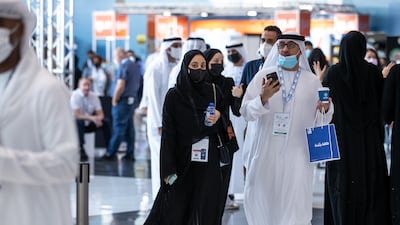The energy industry's biggest event since Cop26 called for a balanced approach to energy transition – taking into account the need for continued reliance on fossil fuels to support growth while preparing for a greener world.
The annual Abu Dhabi International Petroleum Exhibition and Conference, which was held in person this year, assured the world of the continued supply of hydrocarbons, amid outages in several parts of the world.
Countries cannot afford to "simply unplug" from conventional fuels amid ongoing efforts to transition the world economy away from fossil fuels, the conference heard on the first day from Dr Sultan Al Jaber, the UAE's Minister of Industry and Advanced Technology and the managing director and group chief executive of Adnoc.
"We cannot just flip a switch," he told the audience.
In spite of the march towards a zero-emissions future by the middle of the century, the world needs $600 billion annually to develop oil and gas resources, Dr Al Jaber said.
The comments followed the UAE's successful bid to host the 28th edition of the Conference of Parties in 2023. It also followed the pledge by the country, before Cop26 in Glasgow, to reach net-zero emissions by 2050.
By The National's estimate, the week-long event resulted in more than $13.7 billion of investment pledged to develop the UAE's upstream and downstream sectors. The figure takes into account only planned investments and awards by Adnoc, and does not include preliminary agreements by other companies.
However, the main highlight of Adipec was the announcement by Adnoc, the UAE's main energy company, and Taqa, a major player in utilities, to form a joint venture to invest in renewables.
This was a poignant recognition of the role renewables will play for the foreseeable future and was a significant pivot by the state oil company in terms of diversification of its mix.
The companies joined forces to create a global renewable energy and green hydrogen venture that will have a generating capacity of 30 gigawatts by 2030.
The two companies will partner on domestic and international renewable energy and waste-to-energy projects, as well as the production, processing and storage of green hydrogen.
Green hydrogen uses renewable energy to power electrolysis, which splits water molecules into hydrogen and oxygen.
The venture will tap into Adnoc's energy and hydrogen capabilities and Taqa's expertise in renewable development.
Adipec also led to the signing of significant deals to raise the UAE's upstream capacity to five million barrels per day by 2030.
Adnoc announced investments of up to $6bn to advance growth in drilling to support planned capacity increases.
The company also awarded two engineering, procurement and engineering contracts worth $1.46bn to expand the output of the Dalma gas field, which is part of the world's largest offshore sour gas concession.
The UAE's National Petroleum Construction Company and a joint venture between Spain's Teecnicas Reunidas and Target Engineering won the EPC contracts for the development of the Dalma field.
At the event there was continued focus on developing the downstream sector of the oil and gas industry, which refers to the refining of crude and production of petrochemicals.
Adnoc and Austrian chemicals producer Borealis signed a $6.2bn partnership agreement for the development of the fourth unit of a polyolefin manufacturing complex in the UAE's downstream hub of Ruwais.
The Emirates plans to triple its petrochemical production capacity from 4.5 million tonnes – currently produced entirely by the Borouge facility in Ruwais – by 2025.
The Ta'ziz chemicals hub at Ruwais also attracted foreign investment after Japan's Mitsui and South Korea's GS Energy signed agreements to help develop a blue ammonia project in the emirate's downstream hub.

